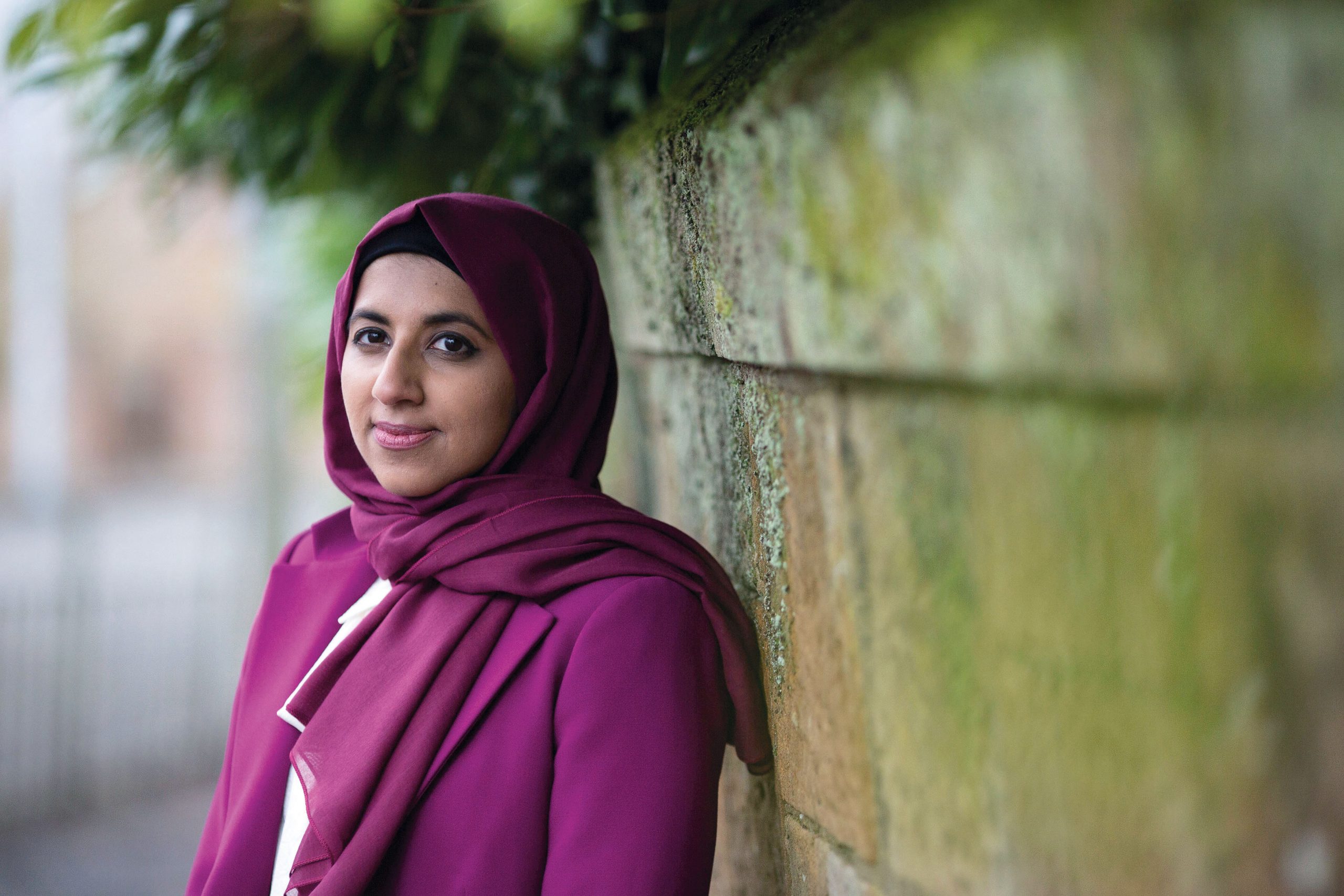
Zara Mohammed is the first woman to become secretary-general of the Muslim Council of Britain (MCB), the UK’s biggest umbrella organisation of Muslim groups. A lifelong Glaswegian, she is the first Scot in the role (mock-wincing at the term “British Muslims”). At 29, she is also the youngest person to be elected to the post, which she took up in January.
“It was time for a change, and time to see a leadership that reflected our reality,” she said, speaking from a cosy room decorated with William Morris-style wallpaper. “It was a bit of a calling as a young person and as a woman that it was time for something a little different at the top.”
Mohammed lives in Glasgow, having moved out of her family home in the city’s West End, where she grew up. Wearing chic thick-rimmed glasses and a stripy shirt, she joked about the interview photoshoot. “People do not appreciate the struggles of a woman in leadership. Make-up? I haven’t even worn shoes in such a long time – you know, like, shoe shoes. As long as you’re happy to have me in my slippers…”
Tired of Muslims being stereotyped – in a country whose prime minister likened women in burqas to “bank robbers” and “letterboxes” the year before he was elected – Mohammed wants to take millennial Muslims beyond recurrent questions of identity.
“The associations are always dark and negative, extremism, terrorism, macabre storylines on TV; we’re not the hero, it’s never in a good light,” she said. “For many of my generation, Islamophobia is a systemic issue in attainment of opportunities and employment – Muslim women, of all the minority groups, are the largest minority of unemployed.”
Her priority is to end the “othering and homogenising” of young Muslims.
Mohammed’s grandparents arrived in Britain from Pakistan in the 1960s; her father’s side, who were merchants, settled in Scotland, and her mother’s side in the Midlands, where her grandfather worked on a Ford production line.
“I’ve never really had an issue with my religion and my identity – like being a Scottish Muslim, or even a British Muslim. But as I got older, from university onwards, that is when I started to see the issues society had with me,” she said.
In her second year of university – she studied law at the University of Strathclyde – Mohammed decided to wear a headscarf, and noticed how differently she was treated. “I didn’t think it was going to have such an impact, but I was being turned down for jobs and interviews, and I noticed people wanting to keep a distance.”
Although she took office in January, when the country was suffering from the second wave of Covid-19, her first week was challenging for other reasons. Four days into her new role, on 4 February, she was repeatedly asked on BBC Radio 4’s Woman’s Hour “how many female imams there are in Britain”. Mohammed said that she did not know: her remit as head of the MCB was civic rather than religious.
A media frenzy followed and the BBC removed its clip of the interview from social media. As many as 100 politicians, academics and journalists signed an open letter sent to the BBC by gal-dem – an influential online publication run by women of colour – condemning the interview. Tim Davie, the BBC’s new director-general, accepted that the national broadcaster had “more work to do” on improving staff diversity.
Mohammed found the interview “hostile and aggressive”, but at least the response to it “sparked a wider conversation” about the status of Muslim women in society.
“Obviously, the BBC has given its standard response, and I do hope it will change things. There has been a commitment for better representation and better understanding, but let’s see what actually materialises.”
Inequalities exposed by the pandemic have so far dominated her leadership. She was struck by the “amount of bereavement and loss within our communities”, as Covid-19 disproportionately affected Muslim lives and livelihoods. An estimated 50,000 Muslims work on the NHS front line, and many more are in “exposed places of work” and “low-income” public-facing jobs, living in “some of the most socio-economically deprived areas”.
Her organisation has also been targeting vaccine hesitancy, which is more prevalent among some ethnic minorities for whom there is greater mistrust of authorities and alienation due to public health messaging. The MCB has published a Covid-19 myth-buster, which corrects a false rumour among some Muslims that vaccines are not halal.
Free speech and religious freedom is another urgent issue. On the row over a teacher showing pupils a cartoon of the Prophet Muhammad in a religious studies class at Batley Grammar School in West Yorkshire, she said, “the well-being of schoolchildren who were impacted was our primary concern, one that was largely overlooked in media coverage”. Mohammed welcomed “the proactive steps taken by all” to reach a resolution on the matter, through “constructive dialogue and engagement”. Three teachers have been suspended while the school investigates complaints by parents.
Since Mohammed started as head of the MCB the work has been relentless. “I would love a day off on my birthday – maybe I should let the organisation know: ‘Please do not disturb me. Let me have cake alone, by myself, in the cupboard!’”
[see also: How a cartoon of the Prophet Muhammad has fractured a Yorkshire school]
This article appears in the 21 Apr 2021 issue of the New Statesman, The unlikely radical





